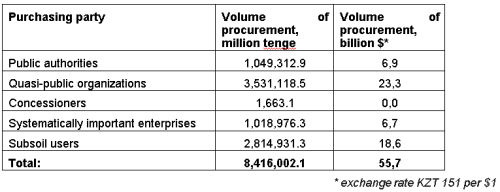Procurement And National Suppliers
Published at www.gratanet.com on 29 April 2015
1. Introduction
As many other countries the Republic of Kazakhstan (the "RoK") during many years takes relevant measures to protect interests of national suppliers of goods, works and services ("GWS").
Such protection becomes of importance taking into consideration volumes of GWS procurement conducted in Kazakhstan. Below are publicly available official data regarding volumes of procurement in 20131.

Quasi-public procurement means procurement of:
- companies of JSC National Wealth Fund Samruk-Kazyna's ("Samruk") group, i.e. companies which are for ≥ 50 % of voting shares (equity) (in)directly owned by Samruk); and
- companies and organizations, which are for ≥ 50 % of voting shares (in)directly owned by national:
- managing holdings (except Samruk),
- holdings, and
- companies2.
Systematically important enterprises mean 98 Kazakhstan enterprises referred to in the list of organizations which GWS procurement are subject to monitoring for Kazakhstan content (the list is approved by the RoK Government Decree (the "GD") dated 20 March 2009 No. 366).
For the purposes of protection of interests of the national suppliers of GWS the lawmakers introduced the concepts of "national suppliers" and "local content" as described below.
2. Status of National Supplier
In 2008-2010 legislative acts of Kazakhstan were supplemented by such new notions as "national (Kazakhstani) supplier of works, services" and "national (Kazakhstani) manufacturer of goods3 (jointly "national suppliers").
The RoK citizens and Kazakhstani legal entities which ≥ 95 % of employees are the RoK citizens have the status of a national (Kazakhstani) supplier of works, services.
The RoK citizens and Kazakhstani legal entities which manufacture goods, for which a CT-KZ certificate is issued have a status of a national (Kazakhstani) manufacturer of goods. Such certificate4 is issued with regard to goods totally manufactured or which passed substantial processing on the RoK territory (i.e. which passed the last substantial processing of the goods sufficient for making the good have its characteristic features).
According to subsoil use legislation5 national suppliers are entitled to a 20% conditional discount when they participate at tenders held by subsoil users.
In procurement of state enterprises and legal entities which are for ≥ 50 % of voting shares (equity) owned by the state6, if GWS procured are referred to in the list of:
- works and services approved by the RoK GD dated 11 May 2014 No. 470 (37 positions); or
- goods approved by the RoK GD dated 19 December 2014 No. 1363 (non-food products – 135 positions, food products – 110 positions), -
then the purchasing organization shall procure only among national suppliers. Only if a tender among national suppliers was acknowledged as invalid, then the second tender is made where all potential suppliers are given access to.
3. Local Content in GWS
Along with the statuses of national suppliers the notions of "local content in goods" and "local content in works, services" were introduced.
Almost all subsoil users have percentage contractual obligations with regard to local content in GWS (e.g. 30% in goods procured, 85% in works and services procured) and shall set out the mandatory percentage of local content (from 0 to 100%) in their advertisements about tenders to be held. Failure to achieve the contractual percentage related to local content in GWS entails a penalty up to 30% of the non-achieved volume of local content.
Local content in goods is equal to the percentage referred to in the CT-KZ certificate. If such certificate is absent, then the local content in goods is zero.
Local content in services in equal to percentage share of payroll of employees being the RoK citizens in the general payroll fund of the supplier of services. At this if a servicing company is a branch of foreign company in Kazakhstan, then the general payroll fund shall be calculated not from the payroll fund of employees of the branch but from the payroll fund of the whole foreign entity. Accordingly, to have high percentage of local content in their services, many branches of foreign company have transformed into Kazakhstan legal entities in the form of a Limited Liability Partnership (LLP).
The percentage of local content in services is indicated by the supplier in its official letter stamped and signed by the authorized signatory, with the reference to the use of the Unified Method of Calculation of Local Content in GWS7 (approved by the RoK GD dated 20 September 2010 No. 964).
If goods are used in works, then calculation of local content is made as follows: for goods – as referred to above (on the basis of CT-KZ certificate), for the rest part – as for the services.
If the contractor subcontracts another entity, then local content is calculated separately for the subcontractor, separately for the scope of work performed by the contractor and is summarized in the general report forwarded by the contractor to its customer.
According to procurement rules of Samruk Group companies, for each 1% of local content in goods a conditional discount equal to 0,15% is provided (max. – 15%), as well as 0,1% of conditional discount per each 1% of local content in works or services (max. – 10%).
4. National Regime and Local Content in Public Procurement
Starting from 1 January 2014 the RoK Law on Public Procurement dated 21 July 2007 (the "Public Procurement Law") was supplemented by the "national regime" notion, i.e. the regime allowing GWS from potential contractors from Eurasian Economic Union to participate in public procurement on equal conditions with national suppliers.
According to the Protocol No. 25 (Protocol on Order of Regulation of Procurement) to the Agreement on Eurasian Economic Union dated 29 May 2014 (the "EAEU Agreement"), its legal force covers procurement made state bodies and public offices (the "1 Group Customers").
At the same time the Public Procurement Law, besides the Customers of 1 Group, also covers GWS procurement made by state enterprises and legal entities which are for ≥ 50 % of voting shares (equity) owned by the state (the "2 Group Customers").
Accordingly, when 2 Group Customers procure GWS, they are entitled to apply to potential contractors a criterion for availability of local content or the status of a national supplier (see clauses 103-104, 112-114 of the Rules of Conducting Electronic Public Procurement approved by the RoK GD dated 15 May 2012 No. 623 (the "Public Procurement Rules")).
Though customers define in tender documentation the method of calculation of conditional price on their own, the RoK Ministry of Finance, as the authorized body in the sphere of public procurement8, recommends applying the following conditional discounts:
- 5% for national suppliers of works, services;
- 0,1% per each 1% of local content in works;
- 10% for national manufacturers of goods;
- 0,1% per each 1% of local content in goods for organization which are not national manufacturers of goods.
All discounts referred to above apply only in procurement of 2 Group Customers.
As for the "national regime" in public procurement:
- according to clauses 105 and 115 of the Public Procurement Rules the criterion – GWS potential supplier being a resident of a EAEU country applies to tender bids of potential contractors participating in public procurement of 1 Group Customers;
- the RoK Ministry of Finance recommends that a 5% conditional discount shall apply to tender bid of a GWS potential contractor being a resident of a EAEU country in procurement of 1 Group Customers, provided that foreign potential contractors not being residents of a EAEU country also take party in such a tender.
5. Local Content in the EAEU Agreement
According to Enclosure No. 28 (Protocol on Unified Rules of Granting Industrial Subsidies) to the EAEU Agreement, the preferences connected to local content for:
- subsoil use contracts concluded until 1 January 2015 remain in force until 1 January 2013, unless otherwise stated by the Protocol of the RoK Accession to the WTO, and
- procurement for Samruk Group Companies and other quasi-public companies – until 1 January 2016 unless otherwise stated by the Protocol of the RoK Accession to the WTO.
6. Potential Forthcoming Laws
According to publicly available information9, the lawmakers plan soon to elaborate and adopt:
- the Law on Procurement, which would regulate procurement of national companies, state enterprises and subsoil users; and
- the Law on Offset Agreements, which would make foreign companies operating in Kazakhstan to transfer manufacturing of associated and replaceable parts to equipment used, as well as its maintenance to local companies in Kazakhstan (as, e.g., in Norway).
1 http://www.nadloc.kz/?page_id=717 (Rus)
2 List of organizations referred to in (i) to (iii) is approved by Government Decree dated 6 April 2011 No. 376
3 The notion "national" is used in public and quasi-public procurement and the notion "Kazakhstani" – in subsoil users' procurement, both notions are identical
4 Conditions and procedure of obtaining, as well as the form of CT-KZ certificate are set out by GD dated 16 July 2014 No. 793
5 Article 78.2 (Support of Kazakhstani Suppliers) of the RoK Law on Subsoil and Subsoil Use dated 24 June 2010
6 See details at https://www.gosreestr.kz/ru/ (Rus)
7 We note that according to the Unified Method the local content is equal to 100% for (i) GWS supplied by natural monopolies subjects and (ii) certain 49 raw products
8 http://goszakup.gov.kz/wiki/index.php/%D0%9D%D0%BE%D0%B2%D0%BE%D1%81%D1%82%D0%B8
9 http://thenews.kz/2014/11/21/1729032.html
The content of this article is intended to provide a general guide to the subject matter. Specialist advice should be sought about your specific circumstances.

